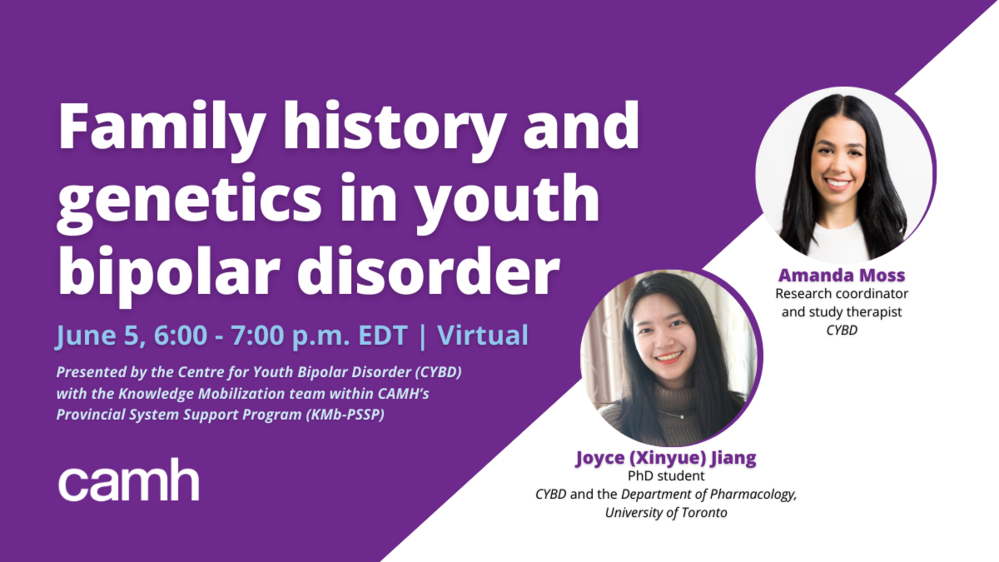About this webinar
Bipolar disorder is a highly heritable mental illness. Similar to other complex conditions, it is driven by multiple genes. This webinar will look at the genetics of youth bipolar disorder, both at the family level and at the DNA level. The single most significant risk factor for the development of bipolar disorder is having a family history of the disorder. This webinar will also discuss the impact of parental mental health on children’s mental health, as well as family therapy options and their treatment targets. Lastly, we will introduce a new project, in collaboration with colleagues at CAMH and people with lived experience, focusing on bipolar disorder in families and across the lifespan.
Date: Wednesday, June 5, 2024
Time: 6:00 - 7:00 p.m. (EDT)
About this webinar series
This is the fourth webinar in a series led by the Centre for Youth Bipolar Disorder (CYBD) with the Knowledge Mobilization team in the Provincial System Support Program at CAMH. The overarching goal of this series is to provide reliable and up-to-date information regarding youth bipolar disorder that is relevant to affected youth and their families. Through this knowledge sharing, we seek to demystify and destigmatize youth bipolar disorder.
The last webinar in our series will focus on diagnosis and co-occurring disorders. If you have any requests and suggestions for topics to be covered in the future, please contact youth.bipolar@camh.ca.
Learning objectives
After attending this webinar, you will:
- Understand the family and DNA level risk factors associated with youth bipolar disorder
- Consider the role of parental mood symptoms on children’s mental health
- Learn about family-focused psychotherapies and their treatment targets
- Be introduced to a new project and advisory committee at CYBD pertaining to bipolar disorder in families and across the lifespan
About the presenters
Amanda Moss is a research coordinator and study therapist at CYBD. She completed her Master of Social Work and an Honours Bachelor of Arts in psychology with a specialization in research at Wilfrid Laurier University. Amanda is a registered social worker who provides dialectical behaviour therapy (DBT) to youth. Amanda is passionate about supporting child and youth mental health through CYBD’s focus on treatment, research, education, and advocacy.
Joyce (Xinyue) Jiang is a PhD student at the University of Toronto's Department of Pharmacology. Joyce graduated from the University of Toronto with an Honours Bachelor of Science in biomedical toxicology. She is interested in the genetics of bipolar disorder, and her projects focus on single nucleotide polymorphisms and polygenic risk scores in relation to bipolar disorder and related clinical characteristics. Joyce enjoys the diversity and interdisciplinary nature of ongoing research projects at CYBD. She also appreciates the friendly and inclusive culture created by all team members.
About the organizers
The Centre for Youth Bipolar Disorder
The Centre for Youth Bipolar Disorder (CYBD) is a fully integrated clinical-research program that seeks to generate discoveries that are uniquely relevant to youth with bipolar disorder. Our focus is on the full spectrum from biology (e.g., genetics, imaging) to clinical trials of pharmacological and psychotherapeutic interventions. CYBD is also committed to advocacy, stigma reduction, and education in the field of youth bipolar disorder. You can find us at www.camh.ca/CYBD and @CYBDatCAMH.
Knowledge Mobilization, Provincial System Support Program
The Knowledge Mobilization team in the Centre for Addiction and Mental Health’s (CAMH) Provincial System Support Program (PSSP) moves evidence to action to improve programming and inform policy change. Our team works closely with researchers, clinicians, policymakers, system planners, service providers, and people with lived experiences to mobilize knowledge and help people connect.


Comments (0)